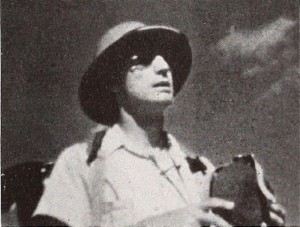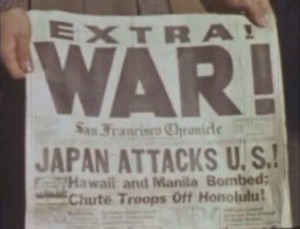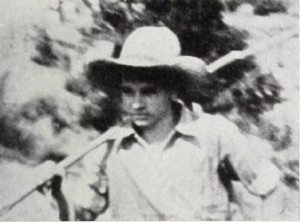"L. Clyde Anderson was given an award for Color photography, for 'October By-Ways.' We want to congratulate Mr. Anderson for his selection of colors. It is one of the very first amateur pictures we have seen where color was really properly balanced. There were no harsh notes to distract, but he chose scenes where the ensemble blended and where there was a fine eye-resting blance of color and also color composition. It was obvious that Anderson used haze filters on his outside scenes as the sky does not have that postcard-blue effect, but has been reduced to almost a gray haze which helps the fall colors in the trees and does not take the eye away from the main points of interest." American Cinematographer, Jan. 1937, 37.
"Black and white film documenting the life experiences of Lorena E. Washburn in Manti, Utah. Film highlights Lorena's years of service to her community, Church, and family." Church History Library.

"Rainbow Fantasy, in the words of Charles C. Hammack, is "an attempt to produce — not a conventional travelog — but more a story of adventure, a hiking adventure to what is probably one of the least visited of our national monuments, Rainbow Bridge, in southeastern Utah." In achieving this goal, Mr. Hammack has been largely and creditably successful. For him and his young wife, Rainbow Bridge takes on the aura of a lost horizon, a Shangri La protected from the outside world by the blistering desert heat and the brutal desert rocks. He brings this overtone of feeling to his film, both through his imaginative camera treatment of the subject and the intentionally dramatic acting of the two travelers. Mr. Hammack's is a new name in Ten Best competition, but it is one which we believe will be heard again."Movie Makers, Dec. 1943, 478.
"Color film celebrating Turner's love for classic automobiles. Turner discovers an old road named Callao and becomes interested in exploring the dirt road with his classic Dodge. Film shares the history of the pony express in Utah." Church History Library.
"Film detailing a year in high school through footage from different school events like homecoming, football games, art classes, and other outdoor activities." Church History Library.
"Black and white and color film that shows a day in the life of a First Nation family in Utah." Church History Library.

"Amateur film footage shot by Dave M. Tatsuno while he was interned at the Topaz War Relocation Center, the Japanese-American internment camp located in Delta, Utah. The footage dates from 1942-1945, the years that Tatsuno was interned in the camp." Archives West.
"Color film of the Turner children go a 'family' vacation. The children dressed as Ma, Pa, and child push a push cart to the Bryce Canyon National Park in Utah." Church History Library.
Stan Midgley travels by bicycle through Utah in this "chucklelogue."

"The Utah Trail is what its producers call a "Cine Musical." In it, Al Morton and his wife have attempted to illustrate in movies a ballad which charmed them and to pay tribute pictorially to a region which they loved. They have been largely successful. The film's continuity is fluid and well integrated; the camera work is uniformly excellent and the double exposed color titles add greatly to the picture's feeling of competence and craftsmanship. Perhaps the Mortons' finest achievement in this production is the care and intelligence with which they have cut their footage to fit the ballad of their choice. The Utah Trail is a charming and colorful tribute to a well loved land." Movie Makers, Dec. 1942, 508.
Total Pages: 4